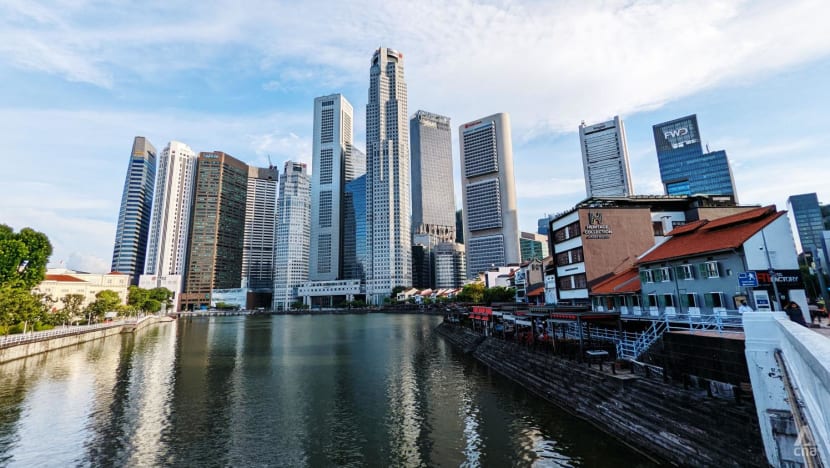New M-SEP scheme designed to ensure firms hire or train local workers: Tan See Leng
The new scheme, announced last month, allows firms that have expansion plans to temporarily hire more rank-and-file foreign workers above the quota for their industry.

A view of the Singapore city skyline on Sep 23, 2022. (File photo: CNA/Try Sutrisno Foo)
SINGAPORE: The new Manpower for Strategic Economic Priorities (M-SEP) scheme is designed with conditions that require participating firms to hire or train local workers, Second Minister for Trade and Industry Tan See Leng said on Monday (Jan 9).
“M-SEP works alongside existing government efforts to develop the local talent pipeline,” Dr Tan said in response to several parliamentary questions about how the new scheme will benefit local workers.
Launched last month, the new scheme allows companies with expansion plans to temporarily hire more S Pass and work permit holders than permitted by the prevailing quotas for their industry.
To qualify, companies will have to meet two conditions.
First, they must be "needle-moving firms" for Singapore’s economic priorities. Second, they will have to commit to hiring and training local workers, by either increasing the size of their local workforce or sending their workers to approved training programmes.
Firms can choose to hire local workers through their own channels or government programmes, as long as these employees are paid above the local qualifying salary of S$1,400. Such firms will need to achieve a net increase in local hires, said Dr Tan who is also Manpower Minister.
Mid-career professionals, managers, executives and technicians (PMETs) hired through other career schemes will also count towards this condition of hiring more locals, he said in response to a question on whether the M-SEP scheme can focus more on mid-career workers.
But authorities are “conscious that it is not realistic” to expect all firms to be able to meet the hiring criteria amid a tight labour market, Dr Tan added.
Firms can send their local workers to a list of recognised training programmes such as those administered by Workforce Singapore or SkillsFuture Singapore.
Firms must “minimally maintain their local workforce share” during the two-year period of tapping the M-SEP scheme.
On how authorities will ensure that the training and hiring commitments are adhered to, Dr Tan said: “Ultimately, these are firms that support our strategic economic priorities, and with which we work very closely with.
“They know that if they succeed, they will need more local workers with the right skills, and it is good business sense to invest in a local talent pipeline while they move to seize new opportunities.”
HELPING FIRMS GROW
Dr Tan said the M-SEP scheme is designed to work with other government programmes that support economic priorities.
“Firms that participate in these programmes contribute towards Singapore’s competitiveness and generate economic opportunities for Singaporeans,” he said.
In response to a question about what the new scheme signals with regard to automation and reliance on foreign workers, the minister noted that the programmes that companies must participate in to qualify for the scheme are related “not just to growth, but also to help firms to become more productive at the same time, through innovation and internationalisation".
“To reduce the reliance on large numbers of low- and mid-skilled foreign workers, and continue in their automation journeys, firms will need to pivot and transform,” Dr Tan said.
The Ministry of Manpower and the Ministry of Trade and Industry previously said examples of relevant programmes include the Economic Development Board’s Development and Expansion Incentive as well as Enterprise Singapore’s Scale-Up SG programme.
Those programmes are in line with important economic priorities such as investing in Singapore’s hub strategy, innovation or research and development, and overseas expansion.
The ministries said at the time that about 1,000 firms – less than 1 per cent of all registered businesses in Singapore – meet this requirement.
“M-SEP is selective in targeting firms or investments that will grow our economy and also grow our competitiveness,” Dr Tan said on Monday.
He added that the M-SEP only provides support for a limited time.
“Even if a company uses additional foreign workers to transform initially, these flexibilities are time-limited and they will cease after the support period,” he said.
He added that SMEs and smaller companies can qualify for the scheme as long as they meet the necessary conditions.
However, outsourced service providers will not be allowed to hire more foreign workers based on their clients qualifying for the scheme, Dr Tan said.
The minister noted that there are other measures in place to ensure that firms that provide essential services, such as in healthcare or the cleaning of public housing estates, have access to foreign manpower for essential functions.
He said that the number of additional S Passes and work permits to be issued will depend on the take-up rate of the M-SEP scheme. Not all of the about 1,000 firms will require M-SEP support, he said.
“We will monitor the takeup rate closely and we will review the scheme accordingly," he added.
The minister stressed that authorities take workplace fairness issues seriously.
Firms that have breached the Fair Consideration Framework or the Tripartite Guidelines on Fair Employment Practices may be barred from work pass privileges and will not be able to qualify for the new M-SEP scheme.
Those that are still undergoing investigations will be assessed on a case-by-case basis.
Noting that authorities are looking to enshrine the Tripartite Guidelines on Fair Employment Practices in law, Dr Tan said: “We will take reference from the penalty framework of the new legislation when deciding on the treatment of such firms.”
He added that manpower should not be a constraint to growth and that it is "most important to ensure that Singaporeans can benefit" from the country’s economic priorities.
“Designed with these principal objectives in mind, M-SEP will strengthen our competitiveness,” he told Parliament.
“The Government will continue to monitor the outcomes of the M-SEP scheme, and will enable us to generate economic opportunities and provide better outcomes for Singaporeans.”














